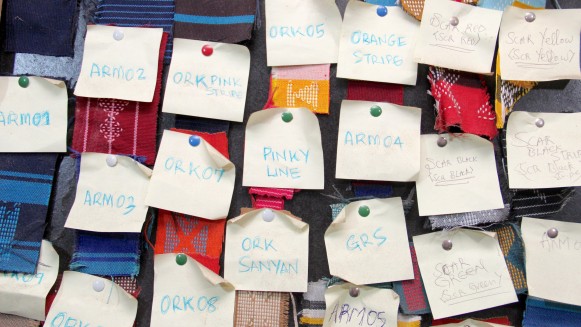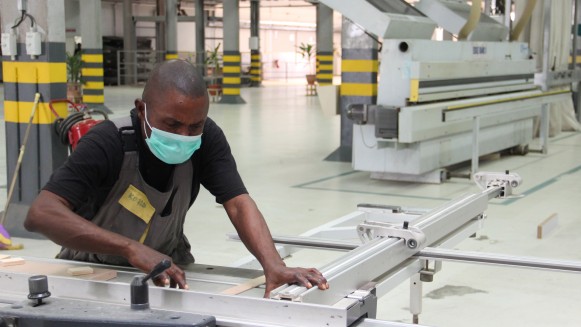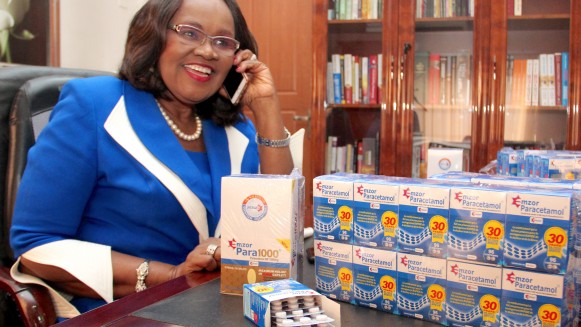In university, Moses studied psychology, but he is all too happy to have found any employment at all in megalopolis Lagos. “Fashion is behaviour too”, said the 31-year-old Ethnik employee in the workshop behind a bungalow in the middle-class neighbourhood Surulere. “Half of my classmates are still looking for a job. I see more opportunities here. Made in Nigeria has the future.”

The Nigerian manufacturing industry represents less than 10 percent of the Gross National Product – in comparison, in countries like China and South Korea it is over 30 percent. Economists have argued for years that this needs to change, and the recent crisis also has Nigerian policymakers convinced of the importance of the manufacturing industry. Even President Muhammadu Buhari recently encouraged his countrymen to buy ‘Made in Nigeria’.
Can this interest for local production, one that has grown out of necessity, contribute to a growth of wealth as well as a lower unemployment rate – which, according to the Nigerian National Bureau of Statistics, is currently around 20 percent?
Tunde Owolabi thinks it can. When he started Ethnik in early 2015, the designer and owner of the local shoe brand of hand-woven aso-oke employed only four people, but now that number has grown to nine. “Ten, if you count my wife who does the accounts”, Mr. Owolabi said with a smile. The 38-year-old entrepreneur trusts his company will keep growing in the future.
Lamentable
“The Nigerians know what Nigerians want
The consultant identifies two kinds of new local businesses. First the individuals with a good idea, who then launch a company with their own savings, like Owolabi’s Ethnik. But it is hard for them to continue growing because a bank loan with a 20 percent interest is simply not an option. Second, there are those entrepreneurs who have access to finance and can start their business on a bigger scale. Such businesses could play a more important economic role as a supplier of jobs.

Sawed to size
Before joining WOODstyles a year and a half ago, Abiodun had his own carpenter’s workshop, a wooden shack by the side of the road. “Sometimes I didn’t have any work for weeks,” the 26-year-old woodworker remembers. “Here I earn a salary every month and also get experience with the latest machines”, he said, while fitting a new bit in his cordless drill.
The furniture factory focusing on interiors for offices and new corporate establishments commenced two years ago, and has since captured a considerable part of that upscale market, WOODstyles Managing Director Samir Bader claims, showing a glossy brochure with close-ups of perfectly detailed kitchens, doors and meeting rooms, with a level of finishing often missing in the handiwork of the small roadside carpentry workshops. “We are unique in our designs and our customers recognise the quality.”
Even so, the furniture manufacturer has been affected by the current economic climate. Products like veneer and timber all have to be imported from abroad, because the quality of Nigerian products is substandard. Under the current exchange rate, this means that cost of production has risen exponentially. “Our margins at the moment are almost zero”, said the director.
The weak naira however also offers opportunities: the doors imported from China that were impossible to compete against before, don’t cost the customer a mere 80 dollars anymore, but 150. This makes the custom-made WOODstyles door panels much more attractive.
We believe in this country, it is ready to grow
Export
Moreover, the manufacturing industry plays less and less the role of a job creator because of far-reaching automatisation, the economist continues: “The low-skilled jobs are the first to disappear, and those are what we need.” Obikili advocates a broader economic diversification according to the Indian example, where they concentrated also on the service and ICT sector.
This would also offer better opportunities to women: in Nigeria, you don’t often find them on the factory floors.
Household name

In one of the Emzor factories, not far from Lagos airport, Kehinde Gbadamosi drops white tablets into tubes that are stuck in a Plexiglas ring, which is then dipped in water. This is how she checks the disintegration time of the orange-flavoured zinc pills meant for children suffering from diarrhoea. In the spotless white corridors of the drugs factory the smell of oranges lingers.
The biochemist says she has learnt a lot since she joined Emzor over a year ago. “Before that I picked up any available job”, says the 34-year-old, who graduated in 2009 and had since worked for a telecom company and a bank. Her gesture towards the shiny stainless steel equipment in front of her shows pride in her job: “I was lucky to find work in my field. Most of my classmates are yet to secure a job.”
Verder lezen?
Rechtvaardige journalistiek verdient een rechtvaardige prijs.
Maak jij OneWorld mogelijk?
Word abonnee
- Digitaal + magazine — € 8,00 / maand
- Alleen digitaal — € 6,00 / maand

